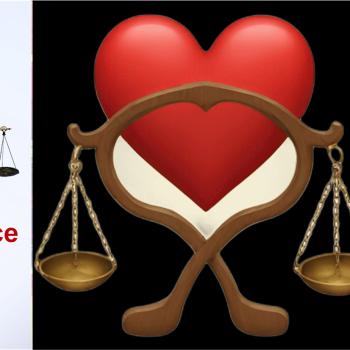By the end of the 19th century, some theologians had found ways to accommodate their ideas to biology, physics, and cosmology, while for others, outright conflict was declared, as scientific methods of studying history, text, and nature were seen as invading the sacred domains of God's action in Scripture and the world. Still for the majority of people in the pulpit or in the pew, science and religion seemed to be irrelevant. We might experience life as wondrous, passionate, full of colors and hopes, but this subjectivity had no counterpart in the realm of objective, scientific knowledge, and sterile, inanimate matter. Instead nature became a barren landscape lacking any ultimate part in the eternal destiny awaiting the faithful. As for this world, we humans were left as "strangers in a strange land," concerned with social, political, economic, and spiritual transformation, but with our religion -- the passion of our total being for our ground and goal -- cut off from our ancient evolutionary roots in earth and cosmos. In the process the environment -- that transitory stage for the only real drama, human history -- was left to our use. Combined with the burgeoning power brought by scientific knowledge, the Biblical role of dominion fell quickly into domination. Since ethics was a matter reserved for one's human neighbor, the environment was a ready target for exploitation. The future might point to heaven, but it was a heaven into which people would be taken, not a heaven that would descend to envelope the cosmos and redeem all that exists. It is thus not hard to see in the combination of Western materialism and technological power one of the principal roots of the ecological crisis that now threatens to engulf the world.
Religion today, especially in secular American culture, is even further marginalized. With the shock of two world wars, the Holocaust, and countless other atrocities, in a climate of religious pluralism which seems to relativize any claims to truth, with a population explosion driving human and environmental misery, can we turn once again to those once mighty streams of wisdom and learning flowing out of the Biblical and historical religious communities for credible inspiration and valid convictions? To so many today, these traditions of Biblical faith, so essential to worship and prayer, seem practically meaningless in the everyday affairs of a `world come of age.'
For ours is an age of the Apollo and the micro-computer, Einstein and Crick, the Space Shuttle and the artificial heart, DNA and relativity. Can the religions of the West still make sense in such an age? When we look to the heavens we picture the universe of Star Trek, a space filled with billions of galaxies, each with billions of stars and life forms in countless numbers. What ‘cosmic' significance can there be, then, to homo sapiens and the religions we have spawned? If most scientists see life as a complex but inevitable biological product of a fertile planet like ours, a product without a goal foreseen by a Creator, how can theologians claim that life is a divine gift of the Spirit? If scientists seem to discover a natural cause for every effect in the world, if everything from a thunderstorm to cancer, from a supernova to childbirth happens because of a natural cause, how can we ever again imagine God as a free agent influencing the course of human and natural history? At worship we might speak about God acting in the world as Creator and Redeemer, but is it more than mere equivocation?
Ground-breaking changes in science
Yet in the midst of what could be the sunset of Western religion after three thousand years of light, astonishing discoveries in the natural sciences and equally impressive changes in Western philosophy are re-opening the grounds for dialogue with theology. Relativity theory, quantum mechanics, Big Bang cosmology, chaos and complexity, human genetic engineering, transfinite mathematics and artificial intelligence are challenging, even tearing down, the rigid and simplistic Enlightenment assumption that the world is a closed network of cause and effect, an autonomous machine made entirely of tiny bits of matter in motion. In its place, the visions of nature suggested by the discoveries of Einstein, Heisenberg, Hubble, Hawking, Godel, Watson, and Crick, though widely differing among each other, point in concert to a nature more open, subtle, numinous, inter-connected than we have known for centuries. In the emerging worldviews of the "new science" our existence as evolutionary creatures gifted with life, self-consciousness and moral agency no longer separates us from the universe around us.
From Big Bang cosmology we are discovering that the universe is ripe for life, mind, and spirit, and that, like all things, it too may have had a beginning and may someday end. From quantum physics we are learning that nature is open, inter-connected and flexible, and that the future is something we can affect by our choices and actions. Studies of chaos and complexity in chemical and biological systems demonstrate the astonishing ability of nature for self-organization and the temporal and historical character of all natural processes. With the discovery of the genetic code, molecular biology has uncovered the link sought by Darwin between all life on earth, the key to biological evolution. This key now bears the potential for profoundly altering our ability to cure human disease, but it brings the ominous specter of "playing God" by affecting the secrets of human nature. And our growing understanding of the fragile nature of global ecology, while underscoring our unity with nature, challenges us to accept our responsibility toward the future of all life on earth.




